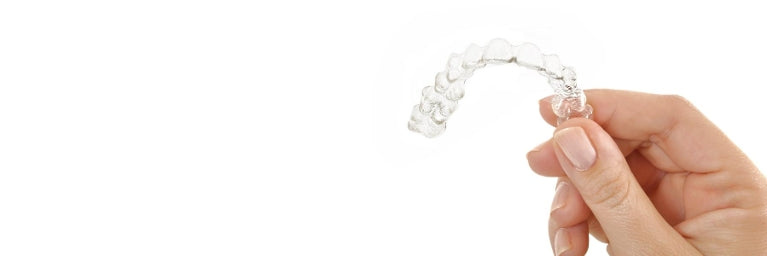
GRINDING YOUR TEETH: WHY IT'S A BIGGER PROBLEM THAN YOU MAY BELIEVE
If you wake in the morning with tightness or soreness in your jaw, perhaps a little ulceration in your inner cheeks, headaches or teeth sensitivity, it’s possible that you could be suffering from Bruxism, or grinding your teeth while you sleep.
While teeth clenching or grinding can be done when awake, dentists tend to be more concerned by grinding your teeth during sleep as your jaw forces tend to be much greater and the clenching or grinding is done for prolonged periods of time.
In fact, per square centimentre, these muscles are able to exert the strongest force in your body. Imagine going to the gym for seven or eight hours straight – the ache you’d likely feel in your body afterwards is what you’re feeling if your jaw muscles are grinding all night.
This common problem can affect lots of different aspects of your health, so it should be taken seriously. Luckily, there’s lots of options you can use, depending on how serious your condition is.
Bruxism Can Destroy Enamel
Your teeth enamel can become worn or even destroyed completely depending on how severe your bruxism or grinding is, and how long you leave it untreated.
Beneath the enamel on the tooth, the dentin, calcified tissue which sits underneath the enamel, can also be damaged. This leads to extreme tooth sensitivity which affects what you’re able to eat and even if you can tolerate opening your mouth to the sensation of wind.
Teeth grinding wears down the surfaces of your teeth and can lead to future problems. If your teeth grinding is severe, this could result in cracked, chipped, wearing or even broken teeth or restoration, which need replacing.
In very severe cases, excessive bruxism left untreated can leads to bone loss around the roots of your teeth. As grinding or clenching puts pressures on the top of the tooth, it will transmit into the bone support and eventually a loose tooth could develop from chronic teeth clenching.
Grinding or clenching your teeth can also throw your TMJ, otherwise known as your jaw joints, out of balance, which may lead to muscle spasms which present as headaches and severe pain in the muscles of the face and neck.
How To Tell If You're Grinding Your Teeth
If your partner hears a grinding noise coming from you when you’re sleeping or if you feel tightness or pain in your jaw during the day, it’s likely you’re grinding your teeth in your sleep. However, there may be no audible sounds if you are clenching your teeth tightly closed.
It’s best to see your dentist to confirm your diagnosis of bruxism. Your dentist will look for wear patterns in the teeth that suggest the wearing down of your teeth.
Treatments For Teeth Grinding
Mouth guards are a common treatment for teeth grinding: a simple plastic covering to insert into your mouth to wear at night.
Mouth guards won’t stop your teeth grinding habit but it reduces the damage and it’s far easier to replace a piece of plastic than your precious tooth structure.
Over the last decade in dentistry, some dentists have been using neuromodulator injections periodically injected into the muscles of the lower jaw and temples of the forehead. This can been very effective in relaxing and temporarily reducing the activity of these muscles, leading to huge reduction in the pain as the medication temporarily switches off the muscle activity.
Stress As A Cause For Teeth Grinding
If you’re under a lot of stress, this can be a major underlying contributor to grinding or clenching your teeth in your sleep.
Some natural, simple remedies to relieve stress, particularly before sleep, include:
- Turning off all devices (including mobile phones, computers and television) at least two hours before you plan to get into bed;
- Writing down anything that’s worrying you or you’re thinking a lot about;
- Taking a hot bath or shower before bed;
- Listening to relaxing music with the lights turned low for at least an hour before you go to bed.
While we are located in Baulkham Hills , we also service Northmead, Baulkham Hills, and Bella Vista areas. Call to book your consultation and appointment.

